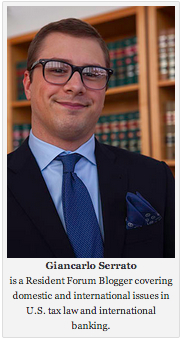 Many people are unaware of the covert banking wars taking place between Switzerland and the United States. The dispute began in 2008 with the UBS Bank scandal – the release of the names of U.S. account holders who had been aided by UBS bankers to constructively and directly avoid paying U.S. tax obligations on their Swiss accounts. Since the Department of Justice’s (“DOJ”) investigation of the UBS scandal, Credit Suisse, Switzerland’s second largest bank, has been in the crosshairs of a very angry Congress.
Many people are unaware of the covert banking wars taking place between Switzerland and the United States. The dispute began in 2008 with the UBS Bank scandal – the release of the names of U.S. account holders who had been aided by UBS bankers to constructively and directly avoid paying U.S. tax obligations on their Swiss accounts. Since the Department of Justice’s (“DOJ”) investigation of the UBS scandal, Credit Suisse, Switzerland’s second largest bank, has been in the crosshairs of a very angry Congress.
On Wednesday, February 26th, the Permanent Subcommittee on Investigations held hearings on offshore tax evasion and grilled the Credit Suisse leadership, which openly admitted that certain “rogue” bankers had solicited U.S. clients and helped U.S. taxpayers shelter income from U.S. tax authorities. Senator McCain (R-Arizona) described one of Credit Suisse’s branches as “worthy of being featured in a spy novel.” The bank branch was located inside the Zurich Airport terminal and operated via a remotely accessed elevator to bring clients to underground conference rooms to discuss their finances.
Congress is equally upset with Switzerland and its politic of banking secrecy and the protection of its national interests.
Credit Suisse, as agreed to in the original DOJ investigation, has given Congress approximately 300 names of individuals who were implicated in active tax evasion. Congress now wants the names of the remaining U.S. accounts holders that Credit Suisse has on its books. Swiss law, however, presents an obstacle as the 1934 Federal Act on Banks and Savings Banks makes it illegal to disclose the names of account holders. Violation of this law, including turning over information to foreign governments, may result in heavy fines and up to five years of imprisonment.
In my opinion, Congress’ approach is the wrong way to attack the problem. Congress has a misconception that Swiss banking is a gigantic infernal machine that is driven by bloodthirsty bankers only looking to maximize client wealth and help clients evade taxes in their respective countries. The history of Swiss banking expounds a much different purpose. Switzerland and Swiss banks have historically provided a secure and safe haven on a continent with a history of political instabilities, wars, and insurrections. Switzerland and its banks originally provided Europeans with a stable currency, government, and economy. The banks assured investors that their assets would not lose value or be appropriated by rogue governments and regimes. In fact, part of the motivation behind the 1934 Federal Act was to protect Jewish assets and wealth from being confiscated by Nazi Germany. Banking secrecy was one way to assure individuals that their assets were safe. As time progressed, Switzerland’s politic in this regard expanded and they system was abused.
So how should Congress approach this issue?
The Senate needs to vote and approve the protocol amendment to the convention between the U.S. and Switzerland for the Avoidance of Double Taxation (Treaty Doc. 122-1) which would give the IRS the power to request the names of certain U.S. taxpayers holding accounts at Credit Suisse and other Swiss banks.
Congress does not see the treaty as a viable solution. The Swiss Federal Courts have not given Swiss banks permission to comply with U.S. demands. Instead, they have established that for the Swiss banks to provide U.S. tax authorities with the names of U.S. account holders without violating Swiss law, U.S. tax authorities must establish that the implicated banks actually aided clients in a fraudulent way. If they cannot meet this “fraudulent” standard, the Swiss banks are not currently permitted to provide the names of the account holders.
Needless to say, Congress sees this as an excuse for Swiss banks to hide behind Swiss law because Congress will not be able to meet the standard imposed by the Swiss Federal Courts. I believe Congress may be throwing in the towel a little too early.
In 2013 the DOJ launched a cooperative program allowing Swiss banks to work with them on issues of tax evasion by U.S. account holders. In some instances, the program shields the participating Swiss banks from criminal prosecution in exchange for their cooperation and the assessment of fines and penalties against those banks.
Credit Suisse, along with 106 other Swiss banks and financial institutions, has been branded a “category 2” bank, the second highest ranking, meaning that the DOJ has identified instances of criminal and fraudulent activity within these institutions. I believe that the IRS and the DOJ will not have as hard of a time convincing the Swiss authorities to allow certain Swiss banks to hand over client information because their presence in the DOJ program is evidence of prima facie questionable banking practices.
Posted April 9, 2014